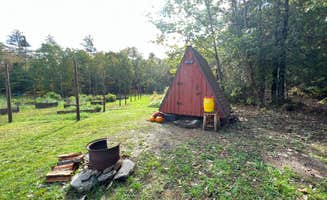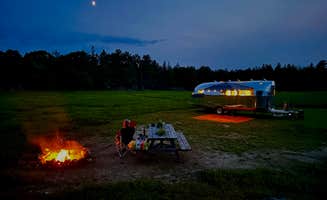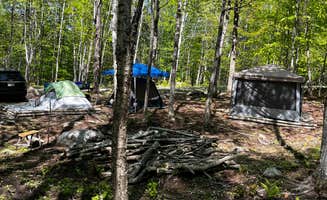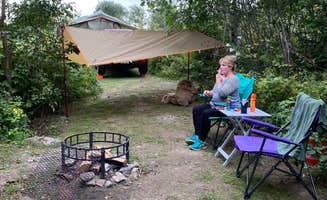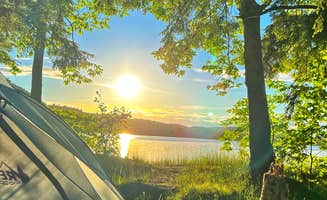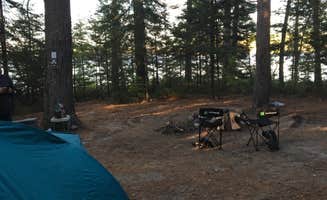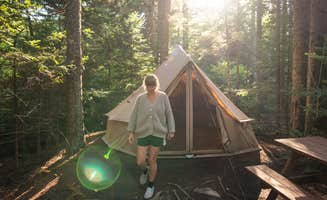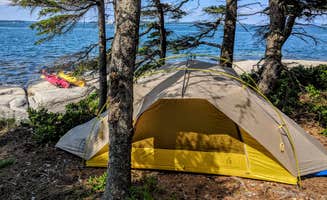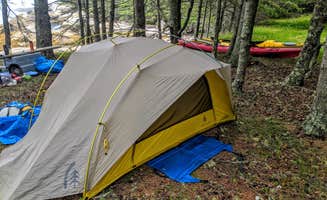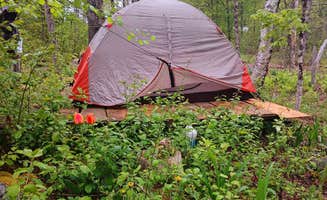Tent campsites near Hermon, Maine typically operate from May through October, with July and August marking peak season. The region features glacial lakes, rolling hills, and mixed forest terrain with elevations ranging between 100-500 feet above sea level. Several primitive camping options require campers to pack in all supplies and carry out waste, with many sites lacking cellular service.
What to do
Blueberry picking: During late July and early August, Continuous Harmony Farm offers camping alongside their organic wild blueberry fields. "Chill out and watch the sheep, or pick your own blueberries alongside their raking crew in their organic wild blueberry barrens," notes Ashley F., highlighting a seasonal activity unique to the area.
Swimming access: Multiple camping areas provide lake access for cooling off during summer months. Amanda F. reports from Donnell Pond: "We were able to swim here as well. We went fishing and did catch a couple of fish! These are public/free and first come first serve sites."
Stargazing opportunities: The limited light pollution makes nighttime viewing exceptional, particularly at remote sites. Shari G. describes Shivers Island as "the perfect place to make dinner, watch the sunrise or set, and star gaze with no city lights or trees to obstruct your view."
What campers like
Quiet environment: Many tent sites provide peaceful surroundings with natural sounds dominating. Adam B. describes Continuous Harmony Farm as "gorgeous, right next to a pond," noting the tranquil setting despite some site proximity issues.
Beach camping: Several locations offer direct shoreline access. "We boated to the boat with our gear and camped there. This lake is huge so keep that in mind," explains Amanda F. about Donnell Pond. "There are two beaches that you can camp on that have sites with fire rings and picnic tables."
Clothing optional options: For those seeking alternative camping experiences, Rough and Raw provides a unique setting. Heather G. shares: "A true hidden gem. We had no idea there was a clothing optional site near Acadia and stumbled across this with hipcamp. A safe and lovely primitive site."
What you should know
Reservation systems vary: Most primitive sites operate first-come, first-served while established campgrounds require booking. Erik C. notes about Donnell Pond: "The hike in is only about 1/2 mile so it's totally doable even if you need to make two trips. The spots are secluded enough but not isolated."
Tide considerations: Coastal camping requires attention to water levels. At Shivers Island, Shari G. cautions: "the tide in this area is significant (9-12 vertical feet), and landing at high tide is nearly impossible on Shivers (and many other islands)."
Site markings often minimal: Several campgrounds lack clear site designations. Adam B. reports from Continuous Harmony Farm: "The sites are not marked at all and there did not seem to be a way to check in. We were joined by two other groups who camped close by, so not great for a private experience."
Tips for camping with families
Accessibility factors: Consider hiking distances when planning with children. Casey mentions Donnell Pond Public Reserved Land offers mixed accessibility: "The one site that is easily accessible is a half mile hike with 9 campsites," though notes more remote sites require either boat access or longer hikes.
Farm experiences: Children often enjoy camping locations with animals and agricultural activities. Ashley F. recommends Soul Retrieve Hill for its "awesome location near Senebec Lake & features a communal area so you can meet other campers!"
Portable water treatment: Many tent sites near Hermon lack potable water sources. Bring water treatment options or enough containers for your stay, especially at primitive sites like Partridge Pond where no drinking water is available.
Tips from RVers
Limited RV options: Most tent campsites near Hermon have restricted vehicle access. Heather C. describes Maine Wild Blueberry Bliss: "We stayed in campsite 2, where the land is open and flat, and there was plenty of room for our rv...It is dry camping, with no hookups, and generators are not allowed."
Generator restrictions: Even at sites allowing RVs, noise limitations often apply. Heather C. continues: "The area was very quiet - at night we only heard the crickets and the wind," highlighting the natural soundscape preserved by generator prohibitions.
Narrow access roads: Forest roads leading to many campsites aren't designed for larger vehicles. Prepare for tight turns and limited turnaround areas when researching tent camping areas that might accommodate smaller RVs.


